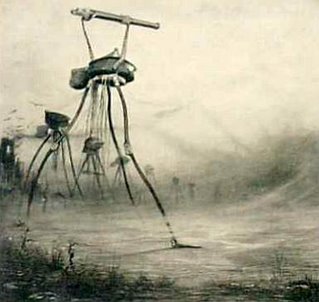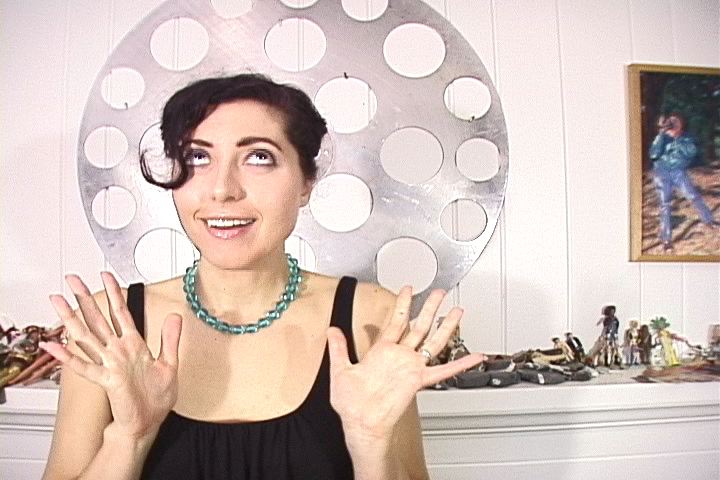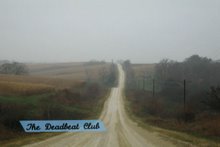World Ending, Lots to Do
 We know now that in the early years of the twentieth century this world was being watched closely by intelligences greater than man's, and yet as mortal as his own. We know now that as human beings busied themselves about their various concerns they were scrutinized and studied, perhaps almost as narrowly as a man with a microscope might scrutinize the transient creatures that swarm and multiply in a drop of water.
We know now that in the early years of the twentieth century this world was being watched closely by intelligences greater than man's, and yet as mortal as his own. We know now that as human beings busied themselves about their various concerns they were scrutinized and studied, perhaps almost as narrowly as a man with a microscope might scrutinize the transient creatures that swarm and multiply in a drop of water.
- With infinite complacence people went to and fro over the earth about their little affairs, serene in the assurance of their dominion over this small, spinning fragment of solar driftwood which, by chance or design, man has inherited out of the dark mystery of Time and Space. - Orson Welles' Intro to War of the Worlds
 Oooh, you gotta love Orson Welles and you gotta love the fact that this guy was only 22 years old when he rocked the nation with his radio play, War of the Worlds, in 1938. Imagine what a guy like Orson would do with the power of YouTube. He'd have us all cowering in our basements and rushing to churches to be saved from hellfires and damnation.
Oooh, you gotta love Orson Welles and you gotta love the fact that this guy was only 22 years old when he rocked the nation with his radio play, War of the Worlds, in 1938. Imagine what a guy like Orson would do with the power of YouTube. He'd have us all cowering in our basements and rushing to churches to be saved from hellfires and damnation.- Of course, using the power of the internet, we'd be able to do some quick google news searches and know he was full of shit in 3 seconds flat but STILL, the fun we would have! Damn it Orson, wish you were alive today to see what a media maelstrom you gave birth to. Top THAT Miss Jackson (cause I am nasty!) and your bare booby scandal!
 Probably the most widely known event to be generally considered a mass hysteria occurred on Sunday evening, October 30, 1938. Orson Welles and his CBS Mercury Theater group presented an adaptation of one of H. G. Welles's then lesser-known short stories, "The War of the Worlds," which described a nineteenth-century Martian invasion of England. The Mercury Theater adaptation was set in the present (1938) and took place in the United States.
Probably the most widely known event to be generally considered a mass hysteria occurred on Sunday evening, October 30, 1938. Orson Welles and his CBS Mercury Theater group presented an adaptation of one of H. G. Welles's then lesser-known short stories, "The War of the Worlds," which described a nineteenth-century Martian invasion of England. The Mercury Theater adaptation was set in the present (1938) and took place in the United States. Perhaps Welles's most consequential decision was to use an "open format" during the first half of the show. Instead of using the conventional dramatic format of background music, narration, and dialogue, the first announcements of the Martian invasion took the form of simulated news bulletins, interrupting a program of dance music. Welles's second most consequential decision was to use the names of actual New Jersey and New York towns, highways, streets, and buildings when describing the movements and attacks of the Martians.
Perhaps Welles's most consequential decision was to use an "open format" during the first half of the show. Instead of using the conventional dramatic format of background music, narration, and dialogue, the first announcements of the Martian invasion took the form of simulated news bulletins, interrupting a program of dance music. Welles's second most consequential decision was to use the names of actual New Jersey and New York towns, highways, streets, and buildings when describing the movements and attacks of the Martians.These two decisions, plus the fact that most listeners tuned in eight to twelve minutes late and therefore missed the Mercury Theater theme and introduction, set the stage for what was to follow. Thousands of people across the United States assumed they were listening to real news bulletins and public announcements. A substantial portion of these listeners became very frightened and attempted to call police, the National Guards, hospitals, newspapers, and radio stations for information. In addition, people tried to contact family members, friends, and neighbors. By the time Mercury Theater's first station break came, informing people they were listening to a CBS radio drama, most of the broadcast's damage had been done.
 The next day, newspapers across the country carried stories of terrorized people hiding in basements, panic flight from New Jersey and New York, stampedes in theaters, heart attacks, miscarriages, and even suicides. During the months that followed, these stories were shown to have little if any substance, yet today the myth of War of the Worlds stampedes and suicides persists as part of American folklore. One clear and certain result of the broadcast, however, was a number of Federal Communication Commission regulations, issued within weeks of the broadcast, prohibiting the use of the open format in radio drama. [...]
The next day, newspapers across the country carried stories of terrorized people hiding in basements, panic flight from New Jersey and New York, stampedes in theaters, heart attacks, miscarriages, and even suicides. During the months that followed, these stories were shown to have little if any substance, yet today the myth of War of the Worlds stampedes and suicides persists as part of American folklore. One clear and certain result of the broadcast, however, was a number of Federal Communication Commission regulations, issued within weeks of the broadcast, prohibiting the use of the open format in radio drama. [...]Below are some highlights from the news stories:
 NEW YORK (AP). Urgent demands for federal investigation multiplied in the wake of the ultra-realistic radio drama that spread mass hysteria among listeners across the nation with its "news broadcast" fantasy of octopus-like monsters from Mars invading the United States and annihilating cities and populaces with a lethal "heat ray."
NEW YORK (AP). Urgent demands for federal investigation multiplied in the wake of the ultra-realistic radio drama that spread mass hysteria among listeners across the nation with its "news broadcast" fantasy of octopus-like monsters from Mars invading the United States and annihilating cities and populaces with a lethal "heat ray."While officials at the Harvard astronomical observatory calmed fears of such a conquest by space devouring hordes from another planet with the wry comment that there was no evidence of higher life existing on Mars--some 40,000,000 miles distant--local and federal officials acted to prevent a repetition of such a nightmarish episode.
As for the 22 year old "man from Mars" himself, Orson Welles, youthful actor manager and theatrical prodigy, whose vivid dramatization of H. G. Wells' imaginative "The War of the Worlds" jumped the pulse beat of radio listeners, declared himself "just stunned" by the reaction. "Everything seems like a dream," he said.
* * * *
 A message from Providence, R. I., said: "Weeping and hysterical women swamped the switchboard of The Providence Journal for details of the massacre and destruction at New York, and officials of the electric company received scores of calls urging them to turn off all lights so that the city would be safe from the enemy."
A message from Providence, R. I., said: "Weeping and hysterical women swamped the switchboard of The Providence Journal for details of the massacre and destruction at New York, and officials of the electric company received scores of calls urging them to turn off all lights so that the city would be safe from the enemy."In Indianapolis a woman ran into a church screaming: "New York destroyed; it's the end of the world. You might as well go home to die. I just heard it on the radio." Services were dismissed immediately.
A man in Pittsburgh said he returned home in the midst of the broadcast and found his wife in the bathroom, a bottle of poison in her hand, and screaming: "I'd rather die this way than like that."
The New Jersey State Police teletyped the following:
 "Note to all receivers--WABC broadcast as drama re this section being attacked by residents of Mars. Imaginary affair."
"Note to all receivers--WABC broadcast as drama re this section being attacked by residents of Mars. Imaginary affair."The switchboard of The New York Times was overwhelmed by the calls. A total of 875 were received. One man who called from Dayton, Ohio, asked, "What time will it be the end of the world?" A caller from the suburbs said he had had a houseful of guests and all had rushed out to the yard for safety.
A garbled version of the reports reached the Dixie Bus terminal, causing officials there to prepare to change their schedule on confirmation of "news" of an accident at Princeton on their New Jersey route. Miss Dorothy Brown at the terminal sought verification, however, when the caller refused to talk with the dispatcher, explaining to here that "the world is coming to an end and I have a lot to do."
 And now for some fun with The Simpsons and Orson Welles' classic - note the great Iraqi war references towards the end (and the mud wallowing is genius). The Simpsons are another bit of modern pop culture that I can imagine Orson digging.
And now for some fun with The Simpsons and Orson Welles' classic - note the great Iraqi war references towards the end (and the mud wallowing is genius). The Simpsons are another bit of modern pop culture that I can imagine Orson digging.Sigh, it kinda sucks he was born so ahead of his time but I guess people in the 30s needed some salacious sleaze to go with their evening cocktails before the auspicious advent of internet porn and Valium.
To think, this radio broadcast is over 60 years old and, if you listen to it today, it is still spine tingling. Especially after 9-11 when martians really did set NYC ablaze. With paranoia so rampant these days, another War of the Worlds incident almost seems plausible. I can understand why people freaked out. After all, it is the end of the world, and I have a lot of things to DO!











No comments:
Post a Comment